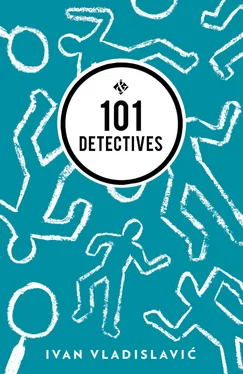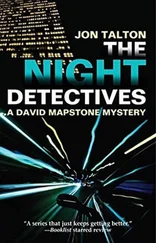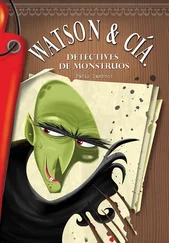Ivan Vladislavic - 101 Detectives
Здесь есть возможность читать онлайн «Ivan Vladislavic - 101 Detectives» весь текст электронной книги совершенно бесплатно (целиком полную версию без сокращений). В некоторых случаях можно слушать аудио, скачать через торрент в формате fb2 и присутствует краткое содержание. Год выпуска: 2015, Издательство: And Other Stories Publishing, Жанр: Современная проза, на английском языке. Описание произведения, (предисловие) а так же отзывы посетителей доступны на портале библиотеки ЛибКат.
- Название:101 Detectives
- Автор:
- Издательство:And Other Stories Publishing
- Жанр:
- Год:2015
- ISBN:нет данных
- Рейтинг книги:4 / 5. Голосов: 1
-
Избранное:Добавить в избранное
- Отзывы:
-
Ваша оценка:
- 80
- 1
- 2
- 3
- 4
- 5
101 Detectives: краткое содержание, описание и аннотация
Предлагаем к чтению аннотацию, описание, краткое содержание или предисловие (зависит от того, что написал сам автор книги «101 Detectives»). Если вы не нашли необходимую информацию о книге — напишите в комментариях, мы постараемся отыскать её.
and
, invites readers to do some detective work of their own. Each story can be read as a story, but many hide clues and patterns. Whether skewering extreme marketing techniques or constructing dystopian parallel universes, Vladislavic will make you look beyond appearances.
101 Detectives — читать онлайн бесплатно полную книгу (весь текст) целиком
Ниже представлен текст книги, разбитый по страницам. Система сохранения места последней прочитанной страницы, позволяет с удобством читать онлайн бесплатно книгу «101 Detectives», без необходимости каждый раз заново искать на чём Вы остановились. Поставьте закладку, и сможете в любой момент перейти на страницу, на которой закончили чтение.
Интервал:
Закладка:
Bloody crybaby, Prof. Ziegler said out loud. She thought of Edward Sheldon, lying on his catafalque under a brocade coverlet, naked but for a dinner jacket, complete with bow tie and buttonhole, which was actually no more than a bib covering his chest and secured at the back with laces.
Mortified, unable to watch for a moment longer, Karolina Fischer turned to the woman beside her and asked whether her safari suit came from Uganda, and the woman said no, her sister-in-law had bought it in Cape Town, and Karolina said she didn’t mean to pry and the woman said not at all, the leopard skin was synthetic, and she was welcome to look at the label in the collar if she wanted to know the name of the designer.
Andrij Leonenko slipped out of his seat and headed for the free wine in the foyer.
At that moment, the girl who had come in late had the same idea.
Rolf Backer wondered what the papers would have to say about this and whether it would be good or bad for sales, and his friend Theo van Roosbroeck, who was biting his lip so as not to burst out laughing, noticed that the woman next to him had begun to record the spectacle on her cellphone.
The young man who had never been to a reading before felt the stirring of an erection beneath the copy of Zucker he was holding on his lap and his new girlfriend, noticing the way he shifted in his chair and gripped the book, thought that perhaps she had misjudged him and he was quite a sensitive man after all.
Hans Günther’s percussive sobs rang through the loudspeakers.
The puzzlement on Maryam Akello’s face had drained away, leaving a residue of cold indifference.
Hans Günther fumbled a handkerchief from his pocket, but it may as well have been a flag of surrender. He wept as if he would never stop.
Horst Grundmann rose and turned to the audience. He crossed his arms and flung them wide and crossed them again. The gesture was meant for the cameraman. Enough, it said, switch off. Look away. When this made no impression, Horst drew the flat of his hand across his throat. Cut! For God’s sake. Kill it! But the camera was unmoved.
Behind Grundmann, Maryam Akello sat quietly on the podium. In the surf of bobbing heads strangers turned to one another, all speaking at once, trying to decipher what they were witnessing, testing out what might be an adequate response or, finding that none was possible, opening their programmes and sinking into the forgiving surface of the printed page. In all this to-do, Maryam Akello sought out Florence Lawino. The look they exchanged was worth preserving for the record, but the cameraman was focused on Hans Günther Basch, stooped over the lectern with the broken pieces of his face in his hands.
The Trunks — A Complete History
Claude and his trunks. Where do I start?
Margery first told me about Claude thirty years ago. Then he was living in a flat in Braamfontein, and she would visit him there or join him for dinner from time to time. He’d been a teacher at the university once but he was no longer working. From what I could gather — and there was never much to go on, the story was full of silences — he was an antisocial and even paranoid person, but also erudite and crankily entertaining when he chose to be. In the mid-1990s, Claude, by then sickly and reclusive, came to live with Margery in Somerset Road. And it was then that she told me about the trunks. I learnt that when Claude and his father Bertrand, whom everyone knew as Berti, had arrived in Cape Town from Europe after the war, the trunks containing their possessions had been put in storage. And there they had stayed for nearly half a century. There was always some reason why it was better to leave them where they were. When Margery took Claude under her wing in Kensington, the baggage was finally retrieved. Berti was long dead by then and Claude, as it turned out, had only a few years to live.
She showed me the trunks, recently arrived by rail from the Cape and stored in the basement of her house. There were four of them: an enormous travelling chest of weathered, canvas-covered board, with hardwood slats and metal catches, so corroded they could hardly be opened; two smaller metal trunks, also rusted and dented; and an even smaller wooden chest with leather trim. Besides these, a few carpet bags, hatboxes, cardboard cartons. I looked at these things from the doorway. They were intriguing, like objects lifted from the bottom of the ocean; and they were also ominous, as if their long quarantine had failed to detoxify them or, like treasure pilfered from a grave, they might exhale some curse. They looked pale, unused to the light. The largest one was the size of a coffin and smelt of damp soil.
Occasionally, in the early years, I had been eager to meet Claude, not merely to satisfy my curiosity, but to fill in a gap in my friendship with Margery. Her mysterious friend was alive only in her accounts of him. In fact, he was so vividly present there, and so insubstantial otherwise, that I sometimes doubted whether he existed at all. But oddly enough, after he came to live in her house, my interest in meeting him waned. In any event, a meeting was discouraged. He had a flat of his own in the downstairs part of the house, adjoining the basement storeroom, which he never left. He did not enjoy visitors, Margery always said, he was impatient and cantankerous. He dribbled and complained. Later, when he was bedridden and increasingly frail, he saw no one at all.
After he died, I was annoyed that I hadn’t insisted on meeting him. Now I would never be able to establish a separate sense of him, and Margery’s stories would go unchallenged. But this feeling faded.
Although I don’t recall the exact circumstances, it was not long after Claude’s passing that Margery suggested I take a look through the trunks. Why? Because I am a writer, of course, and it was obvious that the trunks contained a story. I agreed immediately and we made an appointment for a few days’ time: she would have to unlock them for me and guide me into their contents. But when I thought the thing through at my leisure, something about it oppressed me and I called to put the arrangement off.
Weeks passed before my conscience pricked me. Margery wanted to get rid of these things one way or another, so that she could find a lodger for the downstairs flat, where the trunks were now being kept, the storeroom having proved too dusty or damp, according to the weather. She wanted to air the rooms and sweep away the shadows of the last months. I phoned and said I would come over to look through the trunks as soon as I had a bit of time, this weekend or the one after. But again, when the day arrived, the same gloomy reluctance beset me and I broke the arrangement. There was a touch of pique in my response, I think: she’d never seen fit to introduce me to the old bugger. Why should I take an interest in his dusty papers? But sometimes, as the weeks turned into months, the very opposite impulse would seize me, as I considered an equally fascinating potential, one that a biographer would appreciate. How much more intriguing it would be to meet the man this way, to gain access to his most personal papers and possessions, without the slightest direct impression of a living, breathing creature to spoil things. Then I would begin to worry that she might have got rid of the trunks in the meantime. I would give her a ring — surely she was getting sick of this by now? — and be relieved to discover they were still there. I’ll come past next week, I would say, to open the vault.
At this time, I was making plans to go abroad for an extended period. My departure date drew closer. Finally, Claude’s trunks could not be avoided: I would have to look into them or tell Margery once and for all that I wasn’t interested. In January 1999, I think it was, I made an arrangement to see the trunks, and stuck to it.
Читать дальшеИнтервал:
Закладка:
Похожие книги на «101 Detectives»
Представляем Вашему вниманию похожие книги на «101 Detectives» списком для выбора. Мы отобрали схожую по названию и смыслу литературу в надежде предоставить читателям больше вариантов отыскать новые, интересные, ещё непрочитанные произведения.
Обсуждение, отзывы о книге «101 Detectives» и просто собственные мнения читателей. Оставьте ваши комментарии, напишите, что Вы думаете о произведении, его смысле или главных героях. Укажите что конкретно понравилось, а что нет, и почему Вы так считаете.












